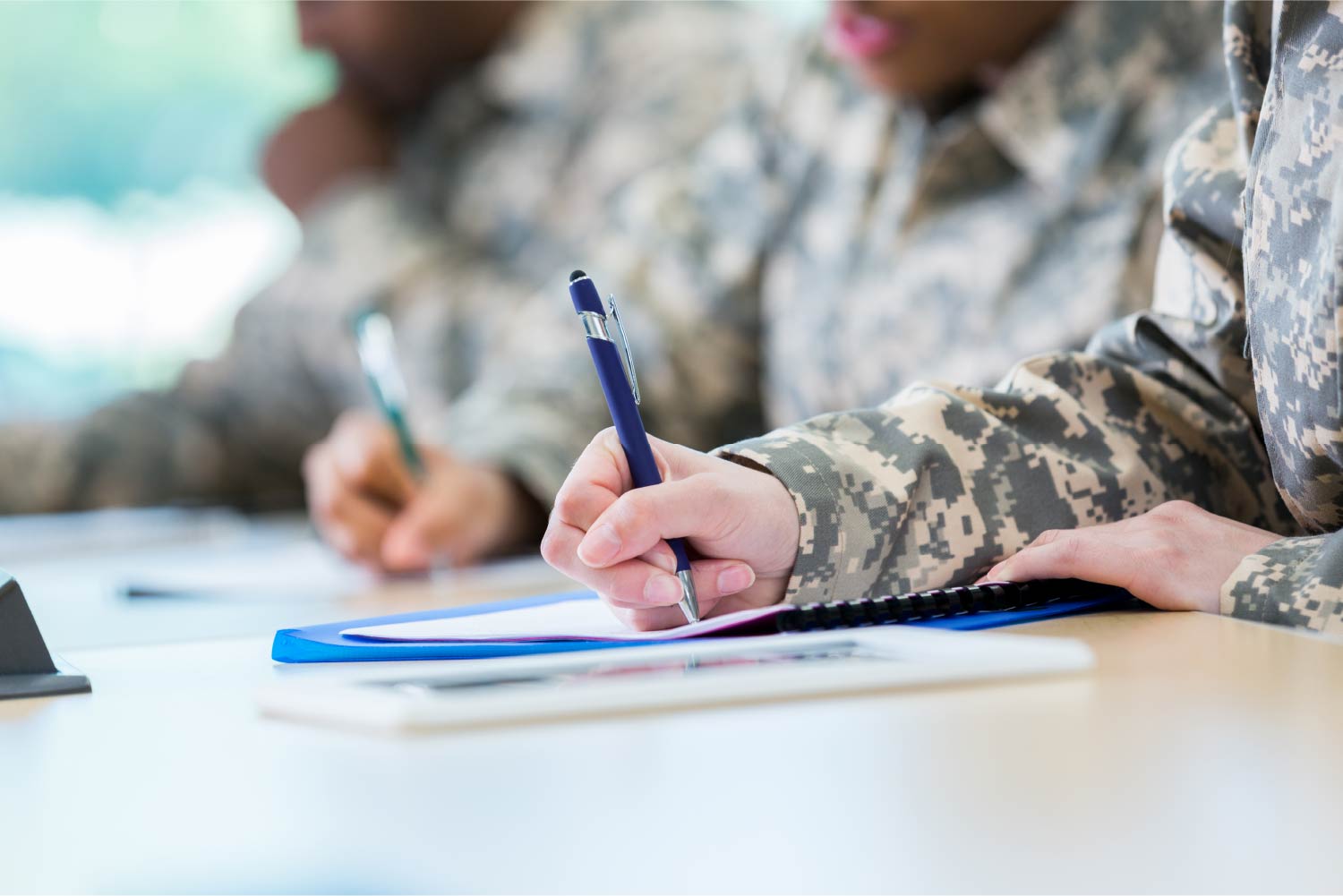Alex Gorsky has been called the “All-American CEO.” In 1996, Gorsky crossed the stage at the University of Pennsylvania and received a master’s degree in Business Administration. Sixteen years later he became the Chief Executive Officer at Johnson & Johnson, the highest-ranked healthcare company to appear on Fortune’s list of the World’s Most Admirable Companies in 2020.
It wasn’t Gorsky’s executive position that earned him the “All-American” name, it was his time in service. He spent six years serving in the U.S. Army and takes a “boots on the ground” approach to leadership, which he has applied within Johnson & Johnson.
His trajectory from military success to professional achievement was bridged by his pursuit of an MBA, which translated his leadership intuition into marketable business practices. That same opportunity is open to you.
If you’re interested in obtaining an MBA as a military veteran, this guide presents how to navigate that process. From top programs to career paths, learn what to expect from an MBA as a veteran.
Military-friendly MBA Programs: What to Look For

Having a clear sense of what you want from an MBA program will allow you to make better, more aligned decisions. Think beyond the simple line “I want an MBA.” What do you want your time at graduate school to look like? Be particular here. Graduate schools make their MBA programs out to be perfect. Try to look past the advertisement and think about the particular reasons why it is the best option for you.
How to Choose the Right MBA Program
Choosing the right MBA program is a process. Combing through factors like financial aid, accessibility, school reputation and curriculum offerings can seem like a needle-in-the-haystack situation. We’ve broken down some things to consider as you assess if MBA programs are military-friendly.
- Student veteran organizations. You want to look for student veteran chapters or programs at your graduate school. After you transition out of the military, you may want to connect with others who have served. You can check if your program has a chapter by visiting this website.
- Online offerings. Veterans tend to be older than civilian graduate candidates because of their time in service. You may find yourself in the position of balancing multiple responsibilities like raising a family and having a job. In this case, a more flexible MBA program is recommended. Check whether your desired MBA program has part-time offerings, night classes or flexible scheduling.
- Cost-effectiveness. You have the potential to receive a considerable amount of financial aid under the Post-9/11 GI Bill, but even with aid, an MBA is expensive. Make sure you understand your financial bandwidth and find an affordable MBA.
- Yellow Ribbon Program. This is the ultimate litmus test to see if a school is military-friendly. If your school is enrolled in the Yellow Ribbon Program, it can help you pay for private, out-of-state or graduate schools. However, there is a maximum number of students allowed based on the agreement between the school and the program. Learn more about the requirements here.
- Career considerations. The question you’ve heard a thousand times before and will hear a thousand times during your MBA: what do you want to do after you graduate? It seems daunting to think about, but it doesn’t have to be entirely overwhelming. The more space you make for reflecting on your career, the less stressful it will be. Reflect on your desired career path and pick a program aligned with that.
- Recruiting efforts. Pay attention to the school’s recruiting efforts. Look for programs that host recruiting events only for veterans. This shows a school’s commitment to supporting veterans transitioning back to civilian life.
The Best Value MBA Programs for Veterans
There is no shortage of best-MBA-program lists on the web. But, for the most part, these lists are geared toward the general student body, not military veterans. These five schools are ranked among the top 30 best MBA programs in North America and also offer up to 100 percent tuition waived for veterans.
- Dartmouth College Tuck School of Business. The Tuck School of Business has pioneered a program called “Next Step” that transitions veterans and elite athletes into business. It’s the premier business education program targeted at military veterans and elite athletes.
- University of Michigan School of Business. This MBA program had the largest cohort of veterans in 2019. This is due largely in part to its signature first-year course Multidisciplinary Action Project (MAP), which relies on teamwork and real-world experience.
- The University of Notre Dame’s Mendoza College of Business. Not only does Notre Dame contribute $16,000 to be matched by the VA for 100 percent eligible veterans, they also have a perfect employment rate for their veterans. Veteran MBA students have earned a 100 percent employment rate every year since 2010 from Notre Dame. Not to mention, their school slogan is the perfect fit for veterans: God, Country, Notre Dame.
- The University of Chicago’s Booth School of Business. A sizable donation of $10 million was donated to the Booth School of Business to finance veteran MBAs. They also offer two types of fellowships: the Carlton Fellowship and numerous Global Innovator Fellowships.
- Duke University Fuqua School of Business. Fuqua’s recruiting efforts stand out. They host an annual Duke MBA Veterans Symposium which offers all prospective veteran candidates the chance to see Duke in the company of other veterans.
How to Make the Most Out of the Application Process

Once you’ve whittled down the field to a handful of programs to apply to, it’s time to ace your application.
Admissions officers go through an average of 15 applications an hour according to the Chronicle of Education. You will need to cut through this information overload with a compelling story.
Highlighting your military experience can be that golden identifier, and below we’ll outline how best to shine a spotlight on it.
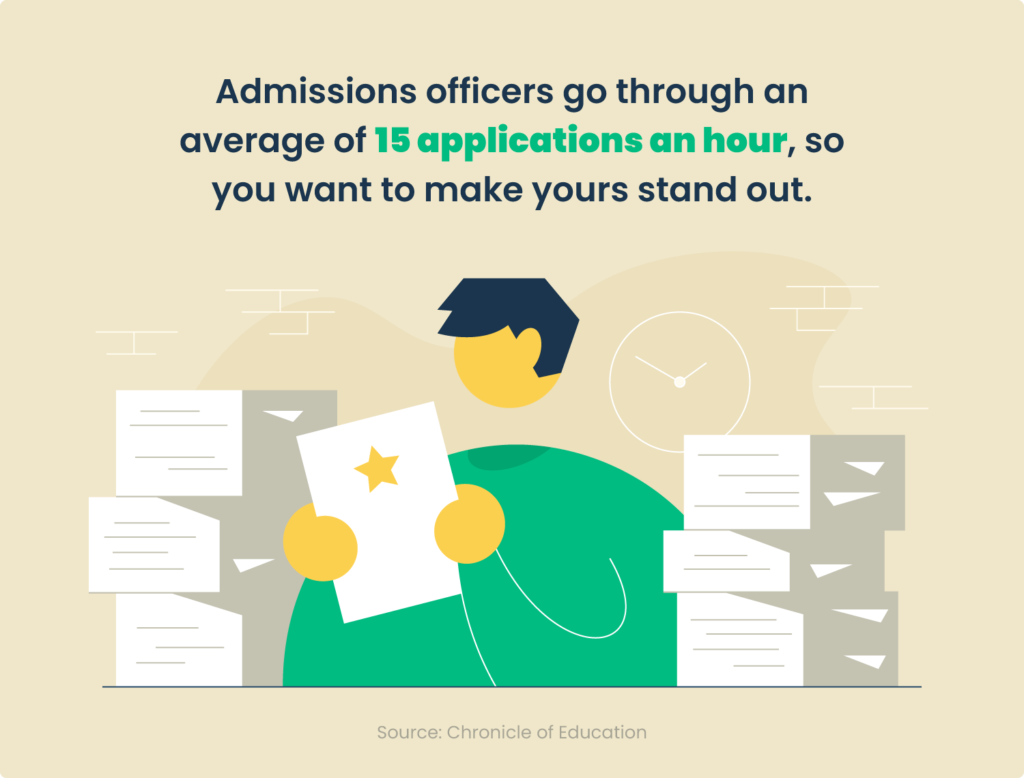
Maximize Your Resume
Your resume is about showcasing your skills, qualifications and experience. While that sounds simple enough, it can be challenging to recount military experiences in civilian terms, let alone make them persuasive.
Start by focusing on the results of those experiences, instead of the actual experiences themselves. Quick decision-making, dynamic teamwork and sunken-cost analysis are all things that apply to business success and are key to military success as well.
Once you’ve translated these experiences to civilian terms, it’s time to take on the resume challenges civilians and military alike face: robots. More institutions are using computer algorithms to qualify applications, so make sure your resume appeals to both humans and computers by doing these four things:
- Include the basics. Double-check you’ve provided your full name, email, phone number, residential address and social information.
- Use action words. When you’re writing about an experience or qualification, include action verbs and avoid cliches. You aren’t a “go-getter,” you’ve proven your proficiency as a leader by organizing a group of soldiers to donate blood.
- Do industry research. You want to do some digging and read the program’s values. Make sure your wording reflects these values. Additionally, research the industry and include common industry terms in your resume. Business buzzwords like “core competencies,” “incentivize” and “growth hacking” can be subtly woven into your resume to highlight your familiarity with the industry.
- Incorporate numbers. Avoid fluff in your resume by sticking to concrete numbers. This also helps you show a result of a project or initiative you’ve taken on, instead of just describing it. For example: “Pioneered and managed two community groups on my local base,” instead of “organized fellow troops.”
Optimizing your resume can feel like a high school English class, but it’s worth it. Communicating for engagement is the goal of a resume, so make it clear and use language that intrigues rather than subtracts from your experience.
Enhance Your Essay
The essay component of your application is an opportunity to individualize your application. Admissions officers scan through test scores, interviews and resumes looking for objective qualifiers. But, this definitiveness doesn’t translate to the essay section. Instead, it’s up to you to tell a story that’s compelling enough, and grammatically perfect, to get passed into the accepted bucket.
You have the chance to individualize your essay, but remember every applicant is telling their own unique story. U.S. Business schools received 135,096 applications in the 2019–20 school year, according to the Graduate Management Admission Council. Four percent of MBA applicants are also veterans, based on MBA Data Guru.
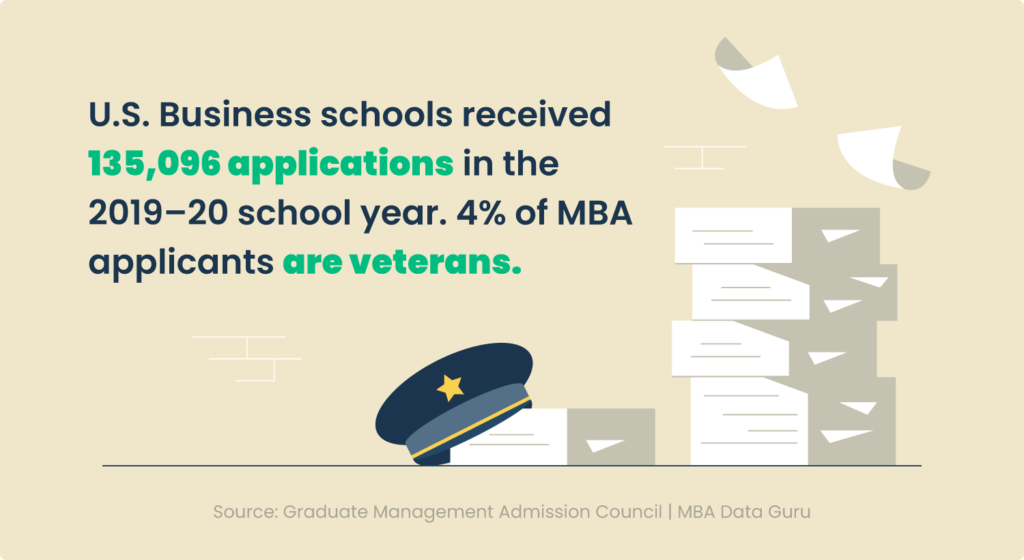
So, telling a generic story, even about your military experience, may be repetitive in the eyes of admission officers. These three tips can help enhance your essay.
- Talk with family and friends first. Organically connect over shared experiences with family and friends. This process of articulating memories will bring in perspective and sensory details that’ll bolster your writing. Your family and friends might remember things as well that will make your story more cohesive.
- Communicate in civilian terms. Admission officers likely don’t know what “Bravo Zulu!” means, nor could they tell you want an IED is. In order to establish a connection between the reader (the admission officer) and the writer (yourself), communicate clearly and use civilian terms.
- Use editing resources. After you’ve outlined your content, it’s time to dig in. You’ll want to go through multiple drafts and use proofreading tools to ensure your grammar is sound. Use Grammarly for editing once you’ve finished writing and before you submit. There are also services for professional editing like Elite Editing, Scribendi and Word Vice which cost money, but you’ll have professional writers reviewing your paper to ensure a flawless essay.
Get Letters of Recommendation
This part of the application is somewhat out of your control. You choose your recommenders and hope they write letters that set your application apart. However, you don’t want to concede that it’s in the recommender’s hand, you want to implement a strategy for choosing who will write the best letters. Here are some quick tips:
- Pick people who know you best. Nothing says “next!” like a mundane copy and paste letter of recommendation. Consider the relationships in your life and choose the ones that are the most transparent. Clear communication is essential in the letter of recommendation process.
- Make the burden easier on whoever you choose to write. Ask them over coffee, not over text. Send along your resume, your essay and other important information that you might want them to mention in the letter.
- Vary who you are asking. Your managing supervisor, an academic reference and a personal reference from a community service organization are three ideal places to find people to ask for a recommendation. Most schools require two references, but asking for three or four is a good idea to hedge your bets.
Ace the Interview
Your resume, essay and letter of recommendation are all one-sided. You work on them and hit send on the computer. But now, it’s time to meet a face of the admissions process: your interviewer.
Interviews can be out of the comfort zone for many veterans because the military doesn’t often host formal interviews. Instead, you’ll be promoted through your efforts and heroism while serving. How can you maintain that effort and communicate your heroism in a structured interview? Here are some things to keep in mind:
- The TIARA approach. T.I.A.R.A stands for trends, insights, advice, resources and assignments. The TIARA approach laid out by Matthew Cowsert in his book is a checklist of things to try to bring up organically during your interview. “I saw that your program is hiring more X. You must have a lot of experience talking with well-qualified candidates, what insights would you have for me? What is your resource library if I wanted to pursue a research project during my MBA?” If you blank on a response, fall back on stating a trend, sharing industry insight, asking for advice, inquiring about resourcing or talking about a completed assignment of yours.
- Know your why. It comes up in a number of ways throughout the application process: why are you interested in [insert name of program]? While it is tempting to spill your whole life story here, do some preparation and keep this response concise. Consider your decision-making process and why you’ve decided to get an MBA. A newly discovered passion, a desire to start a company or a knack for leadership can all propel the decision to attain an MBA.
- Prepare questions. Once you’ve finished answering the interviewer’s questions, it’s your turn. You don’t want to pass up on the opportunity to learn more about the program. Prepare questions by doing some research on the program’s offerings. What courses are most popular? Do they have a career center for professional support? What are the professors like? Consider the blanks you have in your independent program research and fill them in by asking your interviewer.
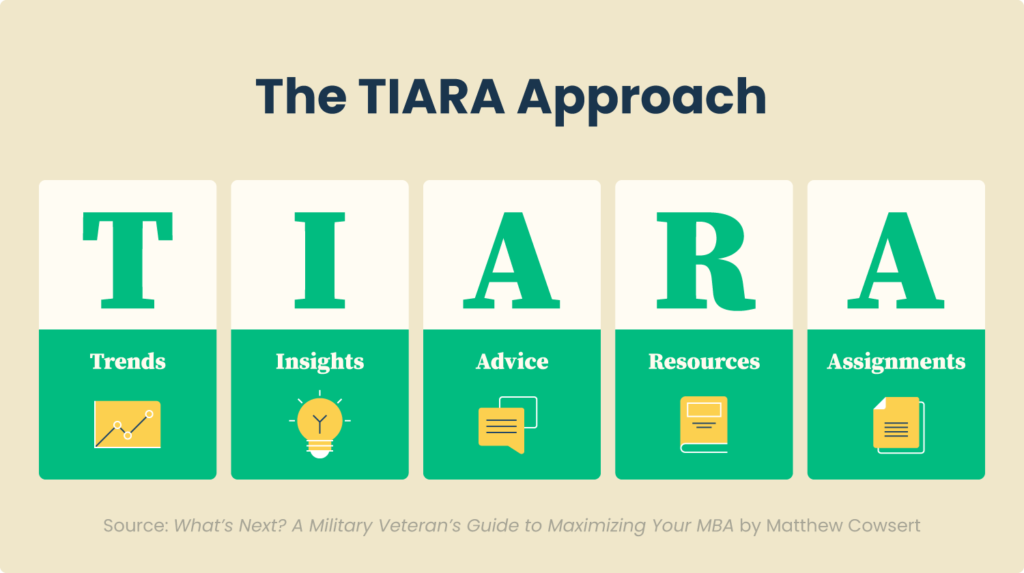
Excel While Testing
You’ll be taking a lot of tests over the course of your time in business school, but you’ll start by taking the biggest one first: the entrance exam. Here’s a breakdown of things to know:
- Determine if you’ll take the GMAT or GRE. Before you start studying, you’ll want to decide if you should take the GMAT or GRE. Most likely, you’ll sit for the GMAT, but in the case that you want to pursue a dual degree, you want to consider the GRE. The GRE is a more general graduate school evaluation. You can use it to apply to get an MS, MA or Ph.D., as well as most business schools. If you’re looking to get just an MBA, then stick with the GMAT, as more consulting and banking firms will ask for a GMAT score.
- Prepare well in advance. This isn’t a test you can pull an all-nighter for — you need to start studying months in advance. Set goals for yourself, consider going to a test prep company and simulate the testing environment to ensure you are fully prepared.
- Know what scores to shoot for. You want to shoot for a 720 or above to be competitive for top tier business schools. According to Military to Business data, the average GMAT at the top 10 business schools is 723, with Stanford’s average being 735. However, if you don’t hit these scores, you’re not doomed to fail. Your unique military experience, essay, letters of recommendation and interview can all attest to your character which might outweigh your test score.
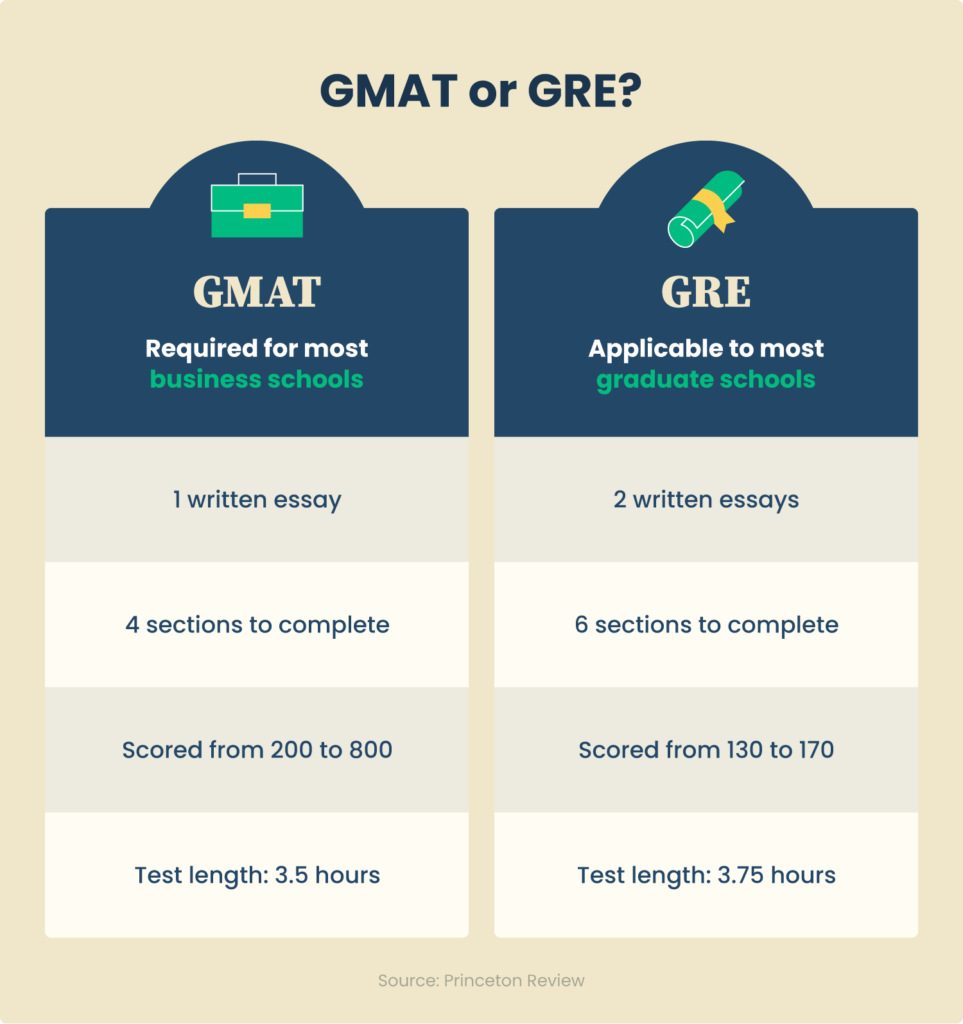
Make the Most of Networks
Ask anyone in business and they’ll say networking is the most important part of the job. Luckily, you have a built-in community with the military. Here are some tips for connecting with a network:
- Start with the MBA Veterans Network. It can be hard to bridge your military experience with private sector work. However, talking with people who have been in the same position can help give insights into the transition. This network is geared specifically for making the transition from service to business easier.
- Optimize your LinkedIn. LinkedIn is no longer an optional social media platform, it’s necessary for your professional life. There are a few ways to showcase your military experience in your social profile:
- Use a photo out-of-uniform for your profile picture.
- Join military-focused groups.
- Follow the programs you want to apply for.
- Get a certificate for one of the veteran-specific LinkedIn Learning paths, like “Translating Your Military Skills to Civilian Employment.”
- Pick a mentor. Vicarious learning has been proven to be an important learning mechanism for success. In fact, according to a theory introduced in 1960 by psychologist Albert Bandura, you can learn through observing the behavior of others. Pick a mentor or role model, and aim to emulate their behaviors.
Commonly Asked Questions

Questions are bound to arise during every stage of your application process. We’ve compiled a list of frequently asked questions to inform these loose strings!
- Will the military pay for my MBA? Getting an MBA is expensive, but using financial aid opportunities can cut down that cost. Start by determining your eligibility for federal education benefits like the Post 9/11 GI Bill or Yellow Ribbon Program. The Department of Veteran Affairs offers several education programs to subsidize higher education, all of which you can see by visiting their website. In addition to government programs, there are countless opportunities for veterans to receive educational scholarships. Apply to as many as you qualify for. Here’s an extensive list of scholarships available to you.
- Do veterans get special treatment in the application process? Admissions offices pride themselves on fairness. Nobody gets specific treatment during the application process, however, your military experience is a major plus. Business companies look for people with leadership qualities and aim to retain the people they recruit. Your military experience comes with leadership and loyalty that can’t be taught in the classroom and can give you an advantage in business. These character traits are what admission officers look for in MBA candidates. So while you won’t get special treatment, your military experience is appealing and can improve your application.
- What’s the acceptance rate for MBA military officers? According to MBA Data Guru, the military MBA acceptance rate is about 50 percent higher than the acceptance rate for traditional applicants. Despite typically having lower GPAs and test scores, military applicants are accepted more frequently because of their unique experience.
- What are the best online MBA programs for active-duty military? If you are an active-duty military member, flexibility is key. However, you don’t want to sacrifice the quality of your education. Here are some of the best online MBA programs based on national reputation, student reviews, affordability and salary potential:
- #1. University of Wisconsin MBA Consortium
- #2. Stevens Institute of Technology
- #3. Northeastern University
- #4. Missouri University of Science & Technology
- #5. University of Massachusetts, Amherst
Military-Friendly MBA Resources

One of the biggest mistakes veterans make when applying for business school is not using all the resources available to them. As soon as you decide you want to commit to an MBA, start by researching all the resources out there.
From books and podcasts to programs and networking meet-ups, the list of resources is exhaustive. We’ve curated some diving off points to get you started:
- Scholarships to look in to:
- Ankin Law Office Veteran Scholarship, award amount: $1,000
- Course Hero Veteran Hero Scholarship, award amount: $5,000
- Imagine America Military Award Program (MAP): $1,000
- Pat Tillman Foundation Leadership Through Action — Tillman Military Scholars Program, Award amount: average of $11,000 annually
- Podcasts:
- Books:
- What’s Next? A Military Veteran’s Guide to Maximizing Your MBA by Matthew Cowsert
- Certain to Win: The Strategy of John Boyd, Applied to Business by Chet Richards
- The Influence of Military Strategies to Business: Skills to Help With Problem Solving and Decision Making by M.D. White
Transitioning into civilian life is difficult. Data from Pew Research shows that 44 percent of veterans who served since 9/11 have had a difficult time re-entering society. However, the data also shows that veterans who were officers and had graduated from college were more likely to have an easy time readjusting.
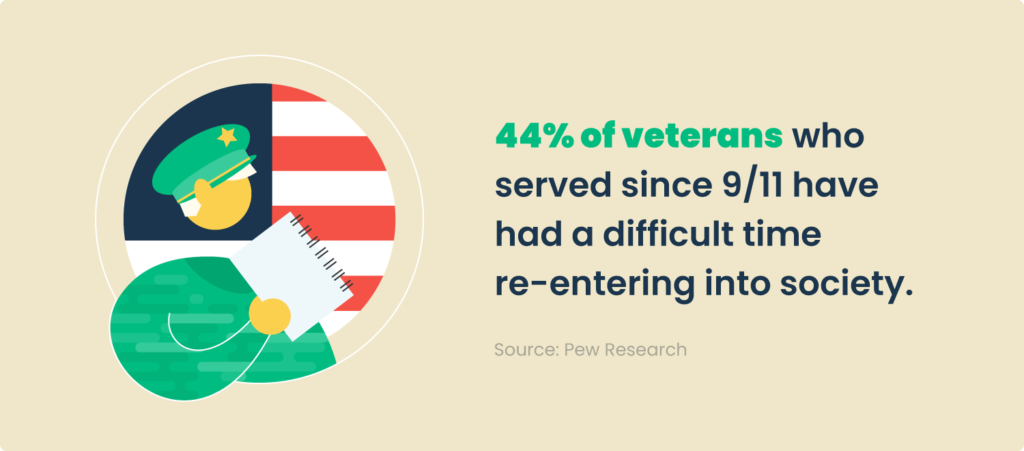
While transitioning from the service back to society can be hard, pursuing higher education may be the motivation you need to bridge military and civilian life. Getting an MBA can translate your instinctive leadership and business qualities into making money in a career.
So, take that next step. If you’re looking for flexibility, check out this list of online MBA program and if you’re looking to attend classes in person, consider a business school in North America. Good luck, soldier!
Sources: Pew Research | U.S. News | MBA Data Guru | Sage Pub | Fortune | Military MBA | Chronicle of Education | What’s Next? A Military Veteran’s Guide to Maximizing Your MBA | Graduate Management Admission Council | Princeton Review | U.S. Department of Veterans Affairs | Social-Learning Theory of Identificatory Processes

